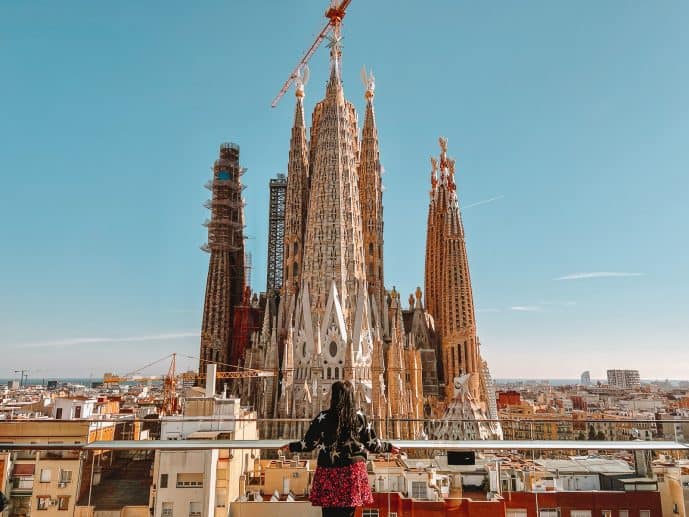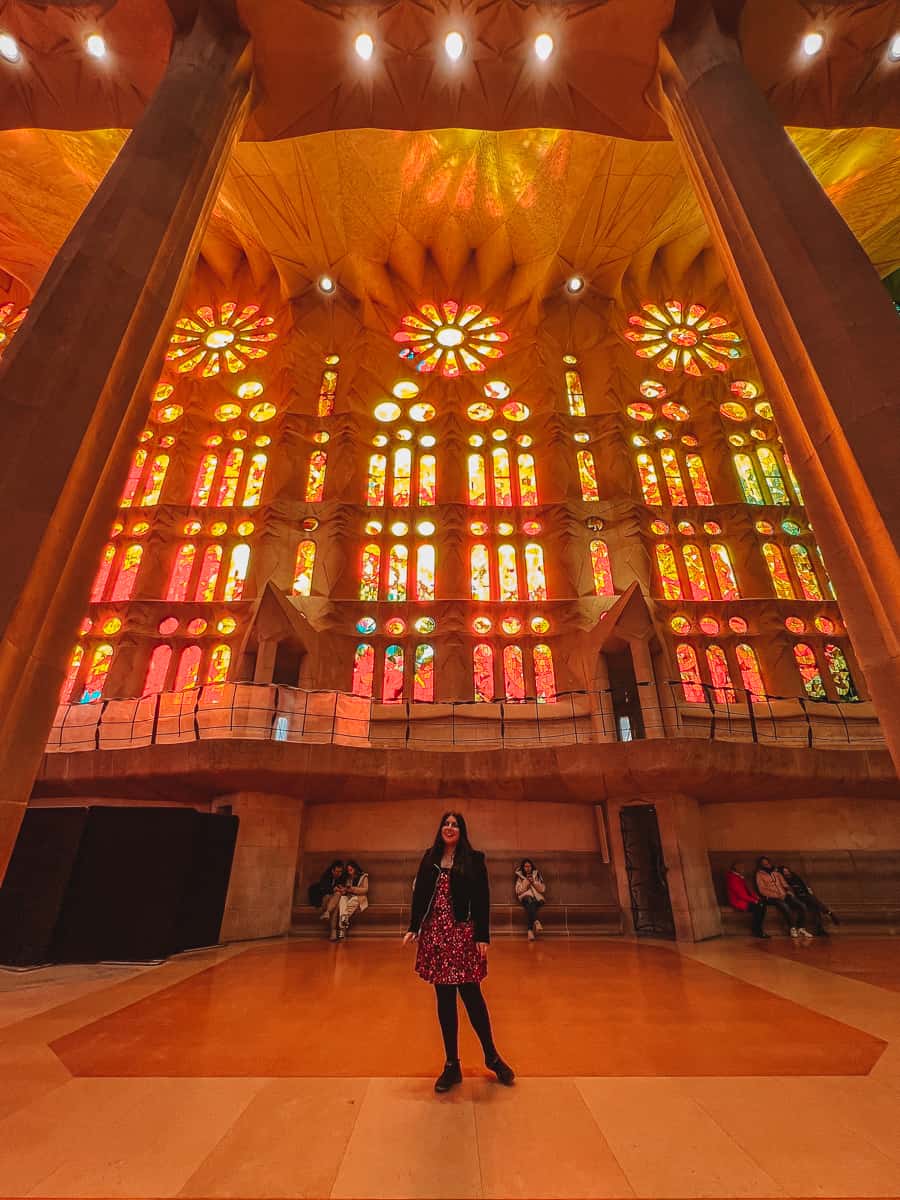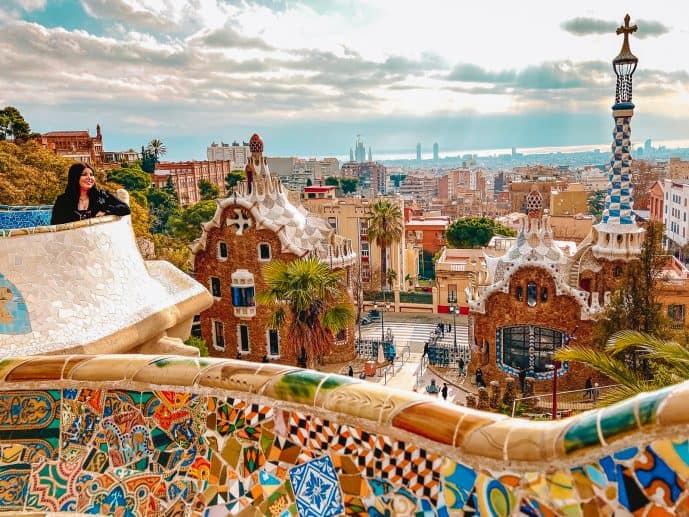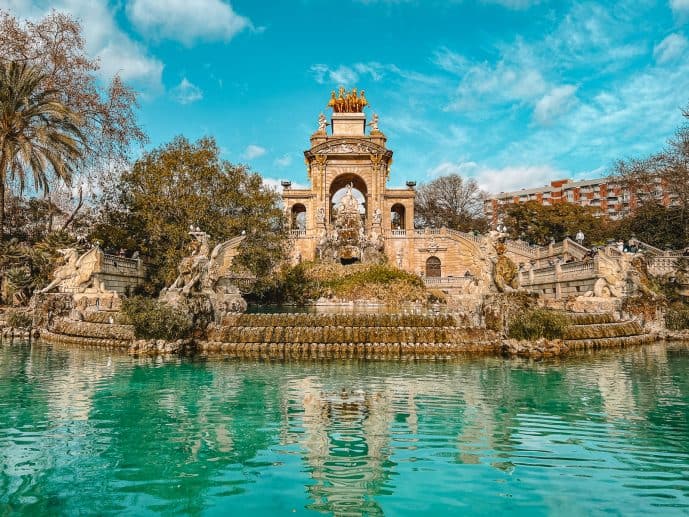This post may contain affiliate links. Please see my disclosure policy for details.
Many people overlook the majestic Casa Vicens on a visit to Barcelona but I think that they are missing out on one of the best attractions in the city.
This incredible summer home was Gaudi’s first house project and is an architectural oasis in the sleepy neighbourhood of Grácia.
As a bit of a hidden gem, you can escape the crowds and enjoy exploring this vibrant summer residence in peace.
I’m a huge lover of art, architecture and design and I was truly blown away. I fell in love with all the ornate and innovative details of this Modernist abode.
Here is a complete guide for Casa Vicens in Barcelona and why you shouldn’t skip Gaudi’s first house project!


Top Barcelona Travel Resources
- Book your perfect hotel stay at Booking.com
- Book your tours and attraction tickets with GetYourGuide
- Thinking of renting a car? Look up Rental Cars
- Don’t forget travel insurance, I always use World Nomads
Casa Vicens history
The story of Casa Vicens begins with stockbroker Manuel Vicens i Montaner who inherited some land in Vila de Grácia.
He commissioned Antoni Gaudi to build his family a summer residence here. Gaudi was only 30 years old at the time.
Gaudi first started planning the design In 1878 and the work officially began in 1883 with it being completed in 1885.
The design used many Oriental and Mudéjar elements as was fashionable for the time. Today, Casa Vicens is seen as a feat in Catalan Modernist design.


When Manuel Vicen died in 1899, his widow sold the property to Doctor Antonio Jover i Puig.
He expanded the property as his primary residence in 1925 and hired architect Juan Sierra de Martínez to complete the work.
The estate was later split as a multi-family residence and much of the original garden and courtyard was demolished in the 1940s.
Casa Vicens became part of the Gaudi UNESCO World Heritage site in 2005. In 2014, the last residents left the property and the banking group MoraBanc bought the house.
They funded an extensive renovation project to help restore many of Gaudi’s original designs and artwork. Since 2017, Casa Vicens is now a museum in Barcelona.

Can you go inside Casa Vicens?
Yes, Casa Vicens has undergone a major renovation and is now open to the public as a tourist attraction.
It forms part of the Gaudi UNESCO World Heritage Site so it’s well worth visiting and going inside if you have the time.
Many people overlook Casa Vicens and prefer heading to the more commercialised attractions such as Casa Batlló.
However, I found that this house had far fewer crowds so I could enjoy exploring in peace.

It was an oasis from the busy streets and a paradise of innovative architecture as well as gorgeous details and design. It was like walking through a Pinterest board.
There are many restored rooms to explore, permanent exhibitions and a rooftop pavilion to enjoy. Plus, there is a gorgeous courtyard garden and café to relax in after your visit!

Things to do at Casa Vicens
1. Colourful Courtyard & Garden
The first place you will enter on your visit is the incredible courtyard which also acts as a garden.
It’s a paradise of palm trees that provide shade, a fountain for a calm atmosphere and a riot of colour with the house in the backdrop.
Gaudi used a Mudéjar style with bold red brick and green and yellow flower tiles for the exterior of the house.
This garden has changed over time but when Gaudi first designed it there was a small waterfall and a lot more foliage.

2. Palm Room & Porch
You start your tour inside the house by entering the covered porch area. This is lined with benches and has a marble fountain.
The fountain in this porch bridges the gap between the garden and the house and the babbling noises from the water create a sense of calm.
As Casa Vincens was a summer residence, this area was designed to welcome visitors and allow them to cool off and relax.

3. Dining Room
The Dining room is the central room on this floor and makes a grand impression.
Much of the decoration and wooden furniture in this room was designed by Gaudi himself and the carvings are intricate.
There are 32 paintings by Francesc Torrescassana along with carvings of plants, birds, flowers and fruits on the walls and ceiling.

4. Sala de Fumar
One of my favourite rooms in the entire house was the incredible blue smoking room or Sala de Fumar.
It was designed with “Oriental” elements which was the fashion for 19th-century Europe when aristocrats were obsessed with Asia and anything Romantic.
The mocarabe tiles are meant to represent palm tree dates and the walls have vibrant papier-mâché tiles.
This retreat would have been used by gentlemen to smoke their cigars and/or play cards after dinner.
During the renovation project, this was one of the most intricate and difficult rooms to recover due to the damage and layers of polychromy.

5. Bedrooms, Living Room & Bathroom
The ground floor was where the family entertained guests but the first floor was where the Vicens family lived in private and could relax.
You’ll find two bedrooms on this floor as well as a living room and bathroom that have all been designed beautifully.


Several covered terraces look out over the courtyard from the bedrooms. This was a way to naturally ventilate the space but also afford privacy.
I loved the blue, white and floral ceramic tiles of the bathroom and the small sitting room with the incredible Trompe-L’oeil painting!

6. Rooftop Pavilion
A very common trait in Gaudi’s house designs is his inclusion of accessible rooftop pavilions.
These were created for the family to escape and find peace with views of the neighbourhood.
The rooftops are always pretty but practical having colourfully tiled chimney rooftops and seating areas.

In Casa Vicens, you’ll also notice that the rooftop has a cupola as Gaudi was inspired by Islamic architecture.
I loved relaxing on this rooftop! As it was winter, it was quite chilly during the day but this terrace was a bit of a sun trap and was delightfully warm.

7. Exhibitions & La Capell Store
The second floor has a permanent exhibition about the history of Casa Vicens.
You can learn about the original house project by Gaudi and information on the major renovations that took place to reopen it.
There are several videos, models and information boards to guide you through and it gives you a great context.
On my visit, they had a temporary exhibit called ‘The First House’. This covered Gaudi’s training, his inspiration, his contemporaries, and how Modernism was the driving force for his design.
Don’t forget to visit the basement as there is a cool gift shop La Capell selling all sorts of Gaudi gifts and books.

8. Casa Vicens Café
After you’ve explored the house, I would highly recommend stopping by their pretty café in the courtyard.
I had a drink and sandwich here during my visit and loved relaxing on the outdoor seats with all the palm trees and patterned tiles.
Gracia is a very peaceful neighbourhood and I found this café to be a little bit of an oasis.

How to visit Casa Vicens in Barcelona
You can find this incredible residence in the sleepy area of Gràcia on Carrer de les Carolines. This is around a 30-minute walk from Sagrada Familia.
Although Barcelona is a great city to walk around. It may be easier to make use of the Barcelona Metro to travel around the city instead.
The closest metro stop would be Fontana on the L3 line (green) and it’s a 4-minute walk from there.
Casa Vicens address is Carrer de les Carolines, Gràcia. Click here for a Google Pin!

Ticket prices and opening hours
Casa Vicens is open throughout the year and the only day they close is Christmas Day on the 25th of December.
In the winter season (November – March) you can visit from 9.30 am – 6 pm and in the summer season (April – October) it opens from 9.30 am – 8 pm.

A basic ticket costs 18 euros for an adult and they have a slight reduction for students, the elderly and 12-25-year-olds at 16 euros.
They do have many ticket offers like guided tours, Sweet Gaudi and Smile Gaudi which includes a photoshoot.
Like with any attraction in Barcelona, it’s always worth booking tickets in advance as they do tend to sell out. This is especially important in the summer season.
Click here to buy your tickets to Casa Vicens

How long does it take to see Casa Vicens?
I’d say you need to budget around 1-2 hours to visit Casa Vicens in Barcelona.
It’s a small house but there are lots of rooms and exhibitions to see plus an incredible courtyard garden, gift shop and coffee shop!
I could have spent so much longer admiring all the pretty details of this house. Every corner was so vibrant and breathtaking.

Is Casa Vicens worth it?
100% YES, although I visited many Gaudi attractions in Barcelona, I found Casa Vicens had a certain untouched charm to it that the others didn’t have.
Many people overlook Casa Vicens for the more popular Casa Batlló but his first residence project is well worth seeing.
I found it a lot quieter here and so I was able to appreciate all the rooms and details away from the crowds. Plus, I took so many photos of all the patterns and architecture!
Don’t skip a visit to Casa Vicens, you and your camera roll certainly won’t regret it.

My top tips for visiting
- Buy tickets in advance – although it doesn’t see as many visitors as other Gaudi houses, this one does get busy too and can sell out.
- Photoshoots – the house has special offers of a photoshoot called ‘Smile Gaudi’ if you want some professional photos on your visit
- Leave enough time – I would leave at least 1-2 hours to explore the house. You won’t want to rush!

Looking for more Gaudi in Barcelona?
One of the most popular things to do whilst in Barcelona is to visit Antoni Gaudi’s houses and they all form part of the Gaudi UNESCO World Heritage Site.
Although Casa Batlló is the most famous, there are plenty of others that you can visit around the city.

Casa Batlló
There are many houses that Gaudi designed that you can visit like Casa Batlló, which is locally called the House of Bones.
The design was based on the legend of St George slaying the dragon and there are many references to this throughout the design like a tiled dragon rooftop, St George’s Sword and a maiden balcony.
It sees almost 1 million visitors per year so make sure to buy tickets well in advance as timeslots sell out.
Although a little pricier, I bought their ‘Be The First’ option and it meant I got in a little earlier than general access at 8.30 am. There were fewer crowds and I got so many good photos – it was great!
Click here to read my complete guide for Casa Batlló

Casa Mila / La Padrera
The next place you can visit is Casa Mila aka La Pedrera which has an undulating facade.
Although considered a Gaudi masterpiece today, this building was hated by the locals of Barcelona until around the 1990s.
Today, it’s a very popular museum and residency. You can climb up to see their Warrior Rooftop for views over the city skyline.

Sagrada Familia
One of Gaudi’s most famous projects is the majestic Sagrada Familia. It’s an intricate temple that was designed by Gaudi and started construction over a century ago in 1882.
It is still a work in progress today and is due to finish in this decade (hopefully). But, you can still go inside and explore what’s finished.
Although the outside of the building is a masterpiece, the interiors will take your breath away.
Top tip – the best view of the Sagrada is from the Sercotel Rosellon rooftop!


Other Gaudi sites in Barcelona
One of my favourite Gaudi sites has to be Park Güell (aka Gaudi Park) high up on Carmel Hill.
It has fabulous serpentine benches in the Greek Theatre, Hypostyle Hall and Laundry Room amongst other incredible pieces. Don’t leave without getting a cheesy selfie with El Drac.
Whilst here you can also explore Gaudi’s House Museum, where he lived until he died. But, you need a separate ticket for this attraction.

Palau Güell is another grand residence that Gaudi built for Eusebi Güell off La Rambla which has another incredible tiled rooftop.
Lastly, Cascada Monumental is also known as Gaudi’s Fountain! Although he didn’t design the fountain he did help with the hydraulics.
Regardless, it’s well worth visiting Parc de la Ciutadella as the fountain was inspired by ancient Greco-Roman legends and it’s spectacular.

Read more of my Barcelona travel guides
How to visit Cordoba Mosque-Cathedral for free
30+ Instagrammable places in Barcelona
How to visit Bunkers del Carmel in Barcelona
The gorgeous Cascada Monumental
Discover Sant Pau Recinte Modernista
Secrets of Pont Del Bisbe Bridge
How to visit the Kiss Wall Barcelona
Why you must visit the Fairy Bar in Barcelona
You must visit Palau de la Musica Catalana
Save Gaudi’s Casa Vicens Barcelona for later!

Here are some Spain travel resources
- Flights: I use Skyscanner to look for flight deals. Try to be flexible with travel dates for the best prices.
- Accommodation: Booking.com is my go-to hotel platform and I’ve used them for years.
- Public transport: You can book trains through the official Renfe site. Also, Trainline works and I found it cheaper on some journeys.
- Car rental: Rental Cars is a great choice that compares all sorts of rental companies and gets you the best price.
- Activities: I love GetYourGuide and use the platform all the time for booking group tours and attraction tickets.
- e-Reader: I love to read Romantasy books and I always take my beloved Kindle Oasis with me. It has an orange light and is waterproof which is perfect for lounging by the pool.
- Travel insurance: I always use World Nomads to book travel insurance. You never know when you’ll need cover!
